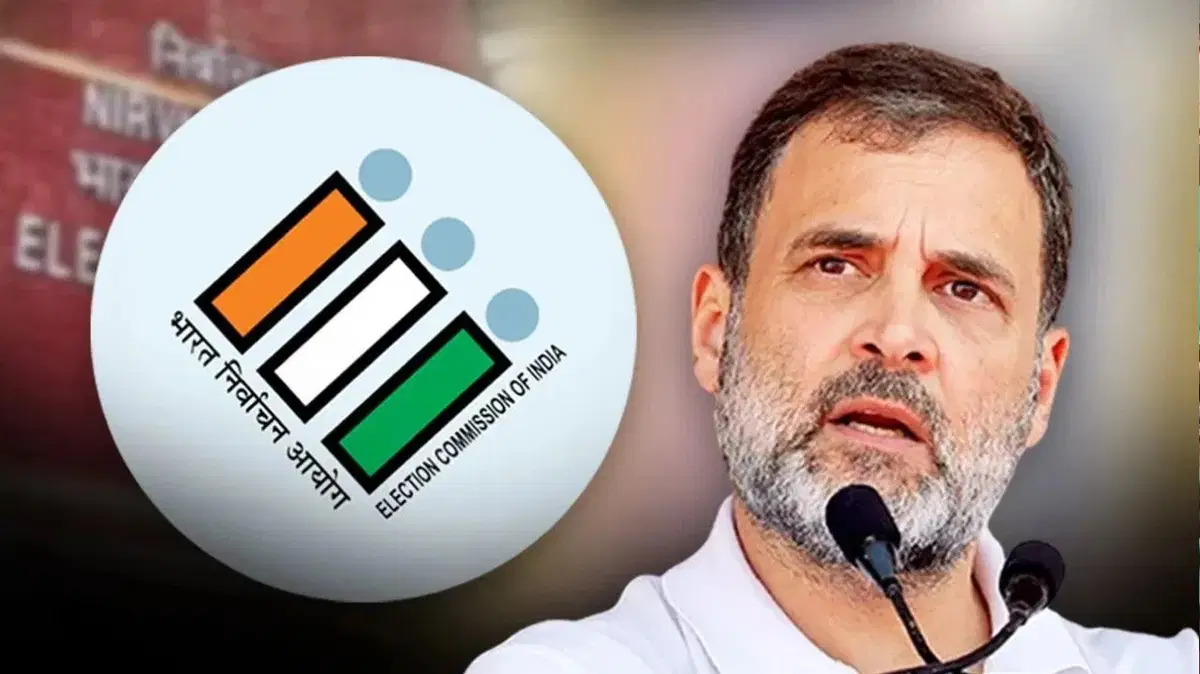Attack on the Election Commission: A Warning Bell for Democracy

Lalit Garg-
India is the world's largest democracy, and at the foundation of this democratic structure lies the Election Commission, a body known for its integrity, neutrality, and constitutional significance. However, when Rahul Gandhi, the Leader of the Opposition and a senior political figure who claims to uphold democracy, publicly accuses the Election Commission of “vote theft” and electoral fraud in Bihar—both in the Parliament and on the streets—it amounts to more than just a baseless allegation. It is, in fact, a direct assault on the very edifice of our democracy. Such statements are not only unfortunate but deeply alarming. The Election Commission’s role goes far beyond merely conducting elections. It ensures transparency, credibility, and impartiality in the democratic process. Coordinating millions of polling officials, security personnel, and logistical mechanisms to enable hundreds of millions to vote in a diverse nation like India is no ordinary task. Time and again, the Commission has proven its commitment to fairness and independence, remaining above political pressures.
Rahul Gandhi’s most recent attack, particularly his opposition to the Special Summary Revision (SSR) of the electoral rolls in Bihar, is not a constructive criticism but an attempt to undermine trust in a constitutional institution. Using fear-mongering and aggressive language against Election Commission officials reflects a dangerous trend in Indian politics—where defeat and political frustration morph into conspiracy theories. His baseless allegations are clearly a product of this desperation. Rather than pointing to technical flaws, he chooses to question the intent of the Commission itself, which amounts to a democratic outrage. This isn’t the first time Gandhi has indulged in such theatrics. When earlier allegations around EVM tampering and Maharashtra elections proved false—even dismissed by the Supreme Court—he simply shifted the narrative without accountability. Ironically, he now attacks the same electoral system through which he himself got elected to Parliament. Is it fair to label the Election Commission as fair when the results are favorable, and accuse it of bias when defeated? Such double standards do not serve democracy—they undermine its dignity.
Gandhi's statements are not grounded in facts. His claim that "30 lakh fake voters were added in Bihar" is not only an exaggeration but a distortion of a routine process. The Chief Electoral Officer of Bihar clarified that these additions and deletions are part of a natural voter list revision, wherein deceased voters, duplicate entries, and migrated individuals are addressed. To portray this standard procedure as ‘vote theft’ is to indulge in dangerous misinformation.What is more worrisome is that Rahul Gandhi refused to present any evidence before the Election Commission or respond to multiple invitations to clarify his allegations. If he genuinely believed in the charges he made, why didn’t he step forward to prove them? Instead, he seems to assume that his family name exempts him from accountability. But India’s citizens today are far more aware and discerning. They no longer blindly believe in sensationalism, especially when it's based on frustration, not facts. The dismal performance of Congress in elections stands as proof of this waning trust.
Such reckless rhetoric only breeds confusion, distrust, and chaos among voters. It is not responsible opposition, but a reflection of immaturity and political recklessness. By attacking democratic institutions, Gandhi is not strengthening democracy—he is chipping away at its core. As Home Minister Amit Shah rightly said in Parliament, with this kind of conduct, the Congress may remain in the Opposition for the next 30 years. Let us not forget—when Congress won the Jharkhand and Jammu & Kashmir assembly elections, was the Election Commission fair then, but became biased only in defeat? Such inconsistency exposes the hollowness of the arguments. Moreover, opposing voter list verification indirectly supports illegal or infiltrator voters—an act bordering on treason. In such cases, even the Supreme Court should take suo motu cognizance and intervene.
If any party or leader has a genuine grievance, they are free to take legal or constitutional recourse. But fabricating lies and spreading disinformation in public forums not only disrespects the Election Commission, it tarnishes India's image globally. The Commission has consistently shown that it is answerable only to the Constitution and the people, not to any political party. It is high time that such misleading and irresponsible statements are strongly condemned, and where necessary, legal action must be taken. If Rahul Gandhi or any other leader continues to make false accusations, the Election Commission should not hesitate to file complaints and move the Supreme Court. Democracy cannot be protected by playing with its institutions; it must be defended by respecting them. In conclusion, India's democratic health depends on the strength, dignity, and impartiality of institutions like the Election Commission. These institutions must be empowered and safeguarded, not maligned for petty political gain. If the opposition wishes to remain relevant, it must do so through reasoned debate and public support—not by poisoning public opinion with baseless accusations.
साभार :
© CopyRight Pressnote.in | A Avid Web Solutions Venture.






